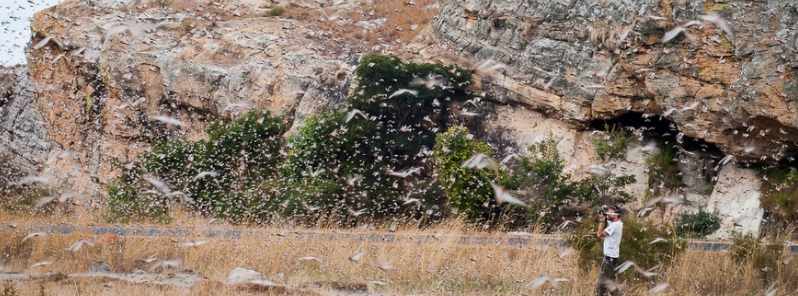Locust swarms from Middle East may reach Turkey, expert warns

Swarms of locusts that invaded the Middle East, including Saudi Arabia, Iraq, Jordan, Israel, Lebanon, and Syria, may reach Turkey next if the country does not take action, an expert warned on April 30, 2021. As of May 3, the UN Food and Agriculture Organization (FAO) said unusually strong southerly winds carried mature adult swarms to the Middle East countries and nearly reached Turkey.
Professor Ali Satar, head of the zoology department of Dicle University in southeastern Turkey's Diyarbakır, told Demirören News Agency (DHA) that it is important to take sufficient action against locusts due to changes in weather events.
Strong southerly winds in April carried groups of mature adults and small swarms from Saudi Arabia to Iraq, Jordan, Israel, Lebanon, and Syria, said FAO. The swarms nearly reached Turkey, while others turned up in the Sinai Peninsula.
The spread of locusts to Iraq and Syria surprised experts as the normal route starts from Saudi Arabia and includes Iran, Pakistan, India, and China. Considering the unprecedented route, locust swarms could reach Turkey.
"We do not think that desert locusts will come to Turkey. But of course, there is a small possibility. Desert locusts can reach millions at a time," he said. "The herd of locusts in Syria is said to be small. But we must always be alert."
1 km2'lik bir çekirge sürüsü 40 ila 80 milyon yetişkin çekirgeyi barındırabilir ve bir günde 35.000 kişi ile aynı miktarda yiyecek tüketme kapasitesine sahiptir!
Dünyadaki en tehlikeli bitkisel zararlı:
Çöl çekirgeleri
Suriye içlerine kadar geldilerpic.twitter.com/1bgbp16PBe— Dr. Ali Recep Nazlı (@recepnazli) May 4, 2021
FAO Acil durum raporu:
Çöl çekirgeleri istilası Türkiye sınırına dayandı.
Nisan ayında birkaç gün devam eden kuvvetli güney rüzgarları, Suudi Arabistan'dan, Irak, Ürdün, İsrail, Lübnan ve Suriye'ye ve neredeyse Türkiye'ye çekirge sürülerini taşıdı. pic.twitter.com/3HahLn0BxT— Dr. Ali Recep Nazlı (@recepnazli) May 4, 2021
"We have to be very careful," he warned, adding that cities on Turkey's border with Syria should be prepared.
"We have to make constant checks. I warn especially the provinces in our border regions. There was a different type of grasshopper in Hatay this year, we need to pay close attention to it."
Satar said he and his assistant found a grasshopper in Mardin and Hatay, which was similar to the locusts in Syria. Further research will be conducted to identify the type of grasshopper found in Mardin.
With swarms expected to increase in May, FAO warned that these could move south to Yemen as well, east through the Persian Gulf, and north to Jordan and Iraq.
Groups of mature adults & small swarmlets are present and being treated in Iraq, Jordan, Syria, Lebanon, Israel & Sinai (Egypt) after arriving from northern Saudi Arabia.
Latest #DesertLocust update https://t.co/p0qAyCHWZQ pic.twitter.com/Bzetz7UPaH
— FAO Locust (@FAOLocust) May 4, 2021
Featured image credit: Flickr

Commenting rules and guidelines
We value the thoughts and opinions of our readers and welcome healthy discussions on our website. In order to maintain a respectful and positive community, we ask that all commenters follow these rules.